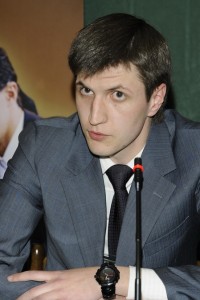Archive for Ноябрь, 2011
So as you might already know I’ve enrolled for State Duma elections 2011 in Russia and going to represent interests of «Fair Russia» party. This post is about the strategy I’ve put down the election campaign that is mainly based on working with social media marketing that is actively used by different politicians. I’ve decided to build my campaign, focusing on tools that I use in daily life — social media technologies.
So, the key weapon here is my personal web-site that explains my participation in elections. I’ve decided to make this site as a independent platform for communication and comments in order not to confuse this political initiative and activitiy with my personal blog (alenapopova.ru / alenapopova.com that is dedicated to eGov services, women and social entrepreneurship in Russia and other countries) and to discuss in greater details my principal views on participation in elections, presenting Fair Russia party and what measures, project I’m ready to suggest. The web-site candidate.alenapopova.ru is based on three main principles: Promise — Action – Suggestion.
My suggestions mainly reflect all experiences and practices that I’d attempted to promote to authorities. So you may find all gov 2.0 services that I support and that are mainly initiated by Novosibirsk citizens. The aim of these actions is to gain popularity after its launch and attract new consumers to useservices. And finally the key part is to make them work efficiently not only before but after elections whatever results are.In my opinion, the most interesting projects that are presented on the web-site are «Fair Budget» and «Change your city». continue reading
There are no doubts that I’m kind of person that likes to set up new goals and reach significant achievements. So by now I have great and serious news to share — I’ve enrolled for upcoming elections to the State Duma in Russia., presenting «Fair Russia» party interests. As for me it sounds exciting and at the same time very challenging, but I’m ready to take all risks. And I’m willing to do my best in order to improve our legislation that would lead to positive changes in our country. What steps have I taken already?
First and furemost, it is important to see myself as the first candidate for the State Duma elections that is going to represent the opinions, interests, ideas of Russian web-users. Why am I actually positioning myself in that way? The answer is concealed in the fact that firstly, while being an active blogger for a couple of years I’ve been learnt how to build relations via social media marketing and I realize that the certain differences that exist between online audience and offline users. Second reason for using Internet users as a key audience in my elections campaign is that about a half of population of the region (Novosibirsk) I’m going to present, are online users and what is more interesting this audience usually is apathetic towards politics and elections.That’s why I think it is very important to take this feature into account and election campaign strategy and consequently motivate online users to raise the voice, express their proactive positions regarding different political/social issues. And I’m sure this communication process will definitely empower voters as a separate unit and give me as a candidate a chance to represent their interests, rights, attitudes in the State Duma.
In order to dwell on efficient work with Russian online users I’ve created a two-way communication within several online channels:
- the official blog/web-site about insight/plans/suggestions of what changes I could bring while being elected in the State Duma;
- Facebook Page that represents a virtual campaign hearquaters that on the one hand represents my personal insight and strivings and the same time allows different people could gather together and discuss their points of view that further could serve as a foundation for new amendments and etc.
- Working with other Russian social networks;
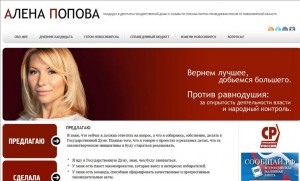 I’m going to talk about every channel in greater detail in my next post, while here I’d like to underlie that I want to be the one who encourage people to believe that together we could make real changes. But these changes would be possible only provided strongest and serious interaction with each other, open dialogue. That is why I hope that such way of online communication will lead to success and mutual public good. While I also think that the only thing that I could promise to myself is that I won’t alter my views regarding that all words should be fulfilled and proved by certain deeds and actions.
I’m going to talk about every channel in greater detail in my next post, while here I’d like to underlie that I want to be the one who encourage people to believe that together we could make real changes. But these changes would be possible only provided strongest and serious interaction with each other, open dialogue. That is why I hope that such way of online communication will lead to success and mutual public good. While I also think that the only thing that I could promise to myself is that I won’t alter my views regarding that all words should be fulfilled and proved by certain deeds and actions.
Let’s do it together! If you’re interested in getting more information about my campaign, please don’t hesitate to contact me or leave your comments!
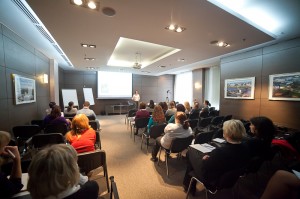 Panel discussion on “Perspectives of development of women’s entrepreneurship in Siberia” was held under StartupWomen project on October, 31 in Novosibirsk. Girls and women who run or have intention to start their own business participated in this event. Also along with me, Natalia Odegova, a business woman from Novosibirsk and a founder of “Remote assistants” project; and Alena Kotova, a member of the Board of Deputies of Tatarsk city of Novosibirsk Region and member of the Chamber of Deputies of NR were among the discussion participants.
Panel discussion on “Perspectives of development of women’s entrepreneurship in Siberia” was held under StartupWomen project on October, 31 in Novosibirsk. Girls and women who run or have intention to start their own business participated in this event. Also along with me, Natalia Odegova, a business woman from Novosibirsk and a founder of “Remote assistants” project; and Alena Kotova, a member of the Board of Deputies of Tatarsk city of Novosibirsk Region and member of the Chamber of Deputies of NR were among the discussion participants.
Our principal thesis was as follows: in terms of women’s unemployment elimination it is more than reasonable to encourage entrepreneurial spirit and activity of women themselves. Moreover, if big and mid-size businesses were concentrated in the hands of men after 90-s(judging from logic of historical and economical processes), then small business may become women’s fiefdom.
And Internet is the fastest way to: first, to learn reply promptly the users’ requests; second, be more flexible and learn from mistakes; and third, learn how not to spend millions and have an opportunity to create a project with low financial barrier of entry.
 ‘Round table’ was held in a dialogue format. I spoke on Russian and worldwide practices, analysed women’s entrepreneurship in Siberia. For example, according to data of Grant Thornton company of 2008, the most of female managers in Russia are in Novosibirsk.
‘Round table’ was held in a dialogue format. I spoke on Russian and worldwide practices, analysed women’s entrepreneurship in Siberia. For example, according to data of Grant Thornton company of 2008, the most of female managers in Russia are in Novosibirsk.
During the survey carried out by this company, 65% of respondents stated that three and more women are among the top-management of local companies. 385 women living in the Novosibirsk region have started their own business since 2008. Many of them may be illustrated as successful women, for example, Tatyana Sokolnikova, Chief executive of ‘Argument” company in Tomsk; Elena Polyakova, Director of Professional development centre, author and coordinator of regional and corporate educational projects; Anna Vibornih, chief of ‘BIS-Novosibirsk’ company; or an acquaintance of mine, active person an successful business lady, Natalia Ibragimova, manager of ‘SibirskayaKopeechka’ chain.
Being in Novosibirsk, we decided that all business ladies should be put in touch with each other, but how we could do that? The answer is to carry out round tables and regular discussions. What for? We want the issues to be solved and ideas to be scaled. We often find out in our sessions that two different teams in two different cities work on the same idea, moreover, they both have similar problems. So why not to solve this problems conjointly?
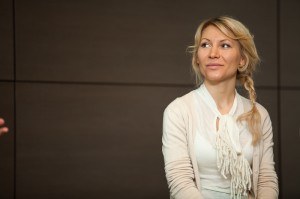 Social entrepreneurship became an important topic for our panel discussion. There were many questions in the audience, like what that is and how to do this. We discussed the examples of successful social projects in Russia, such as Urtam.ru, it’s a boarding school for disabled children, where they are nurtured to be Paralympic champions. Another example, ‘Archangelsk professional rehabilitation centre for disabled’. Also, there is a chain of recreation centres ‘Baby-life’ in Perm.
Social entrepreneurship became an important topic for our panel discussion. There were many questions in the audience, like what that is and how to do this. We discussed the examples of successful social projects in Russia, such as Urtam.ru, it’s a boarding school for disabled children, where they are nurtured to be Paralympic champions. Another example, ‘Archangelsk professional rehabilitation centre for disabled’. Also, there is a chain of recreation centres ‘Baby-life’ in Perm.
The audience was concerned by the issue of how to create a web project that could let women earn money being at home with children, and also how to help with employment of those categories of citizens who are unemployed now. Moreover, how to educate them and improve their performance, which could reduce costs of their the client companies. Natalia Odegova, the founder of ‘Remote assistants’ project, shared her experience and spoke on solutions she offered. Natalia created her project when she was in maternity leave. The results can be already seen.
Overall, summing up the results of the event carried out, we decided to put on our web-site www.startupwomen.ru the schedule of meetings, panel discussions and teleconferences that are going to be carried out regularly in Novosibirsk and other cities. Our aim is to help Siberian business women with projects implementation. Among the plans of Startup Women now is designing of e-business educational program for women, they could participate in on attractive terms, and increasing of number of meetings with successful business ladies for experience interchange and issues discussion.
A number of serious competitions among developers that are aimed to implement new eGov services or projects that could be further used by authorities or other specialized companies have been conducted recently in almost every Western country. Developers in turn could derive a variety of benefits starting from free educational or qualification programme to more profitable — money prize. Personally I was interested in these kind of contests and has always wanted to do something similar in Russia. Once it is proclaimed it should be done later on.
So, now I’m very pleased to announce the launch of our new eGov intiative — Code4Russia that represents a separate but connected eGov iniative that works under Gov2People project that as far as you might know considers all existed eGov services in Russia and reviews international practices that could be used in Russian virtual reality.
By all means, Code4Russia has little in common with analogous Western projects, firstly due to different objectives that we set up as Russian reality has its own rules and regulations under which project could be conducted. Code4Russia represents the largest Russian online unique project that includes «Coding for Russia» — All-Russian contest of developers in eGov context and special project called «Developers expertise.»
So now let’s speak about every project in detail and perspective, what distincive features they have and what further opportunities they provide.
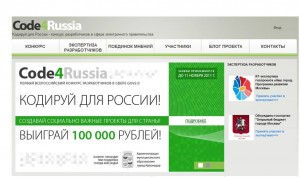
Developers expertise is the first project of that kind in Russia that can be seen as an expert’s crowdsource model that is made to encourage best IT-specialists of e-govermeent project and services to leave comments and feedback. The main difference between developers and consumers of eGov services that IT-experts are more likely to share its constructive professional view on what has been done wrong by government and what can be done to improve this or that feature.
The main problem of today’s projects and eGov services is contained in its unclear presentation and negative perception by the target audience as these projects are not user-friendly at all. Once a new eGov project is launched a certain amount of negative comments in media and social networks appear with saying that «it has terrible or worst interface I’ve ever seen» that at times seems to be very true. There is no integrated consumers’ feedback system exist at the market. That is why our project aims to improve interface and usability of eGov services, to get constuctive evaluations from IT-experts and their suggestions that would create a platform for effecient e-government marketing development. continue reading






